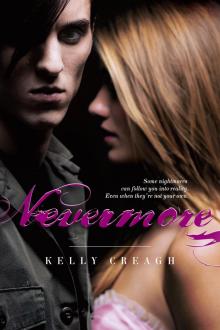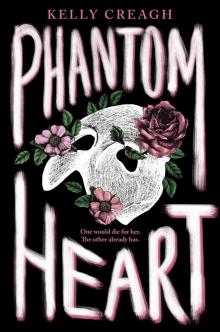- Home
- Kelly Creagh
Enshadowed
Enshadowed Read online
Page 1
Prologue
Washington University Hospital Baltimore
October 7, 1849
“Edgar?”
Speaking softly, Dr. Moran leaned over his patient. His eyes traced the wan and pallid countenance of the famous poet, Edgar Poe. But the man who lay on the hospital bed before him now, bathed in the dim yellow lamplight, bore little resemblance to his dignified portraits. He seemed, instead, more like a ghostly shell of that man, a wasted imposter, his cheeks shadow-sunken, his skin waxen, white as the sheets beneath him. Dark lashes fringed his bruise-purple lids, serving to blacken the deep crescent-shaped hollows beneath each eye. Sweat glistened on his broad brow, less from fever and more, the doctor knew, from exertion.
Rain pattered against the vaulted Gothic windows, glittering crystal beads that quivered into long streaks against the backdrop of darkness.
Though morning approached, the shadows of night pervaded the otherwise empty room.
Outside, the wind moaned, while the clop of horses’ hooves and the rattle of carriage wheels echoed from the alley below.
“Edgar,” Moran spoke again, “can you hear me?”
Poe’s eyes drifted lazily open, glassy and distant, like the sightless eyes of a child’s doll, black as inkwells. He stared at the ceiling.
Moran checked his patient’s pulse, his thumb and finger clasping the clammy skin of the poet’s wrist. There, a racing throb marked the seconds.
The doctor hesitated. He did not wish to send his patient into a frenzy yet again. Still, he could not help but press for another moment of lucidity, another brief glimmer of the man locked within the mania. Another clue to the puzzle of what had happened four days ago, when Poe had been brought into his care, delirious, covered from head to foot in ashen grit, insensible, dressed in another man’s clothing and unable to relate a single coherent detail as to where he had been—or who he had been with, for that matter.
“Do you remember where you are?” Moran asked. The doctor shifted in his seat, and the old wooden chair creaked beneath him.
Suddenly Poe’s arm shot out. He grasped for the doctor, locking his wrist in a grip that held all the strength of rigor mortis. “Who is it?” Edgar gasped, a rattle sounding in his chest, his voice husky, raw from the hours of screaming. “Who is here?”
“Be calm,” Moran urged. He allowed Edgar’s clammy grip to remain, hoping that the physical contact would somehow ground him, that it could bring him back, tether him to reality.
“Reynolds?” Poe whispered. His hand tightened around Moran’s wrist with unbelievable strength, quivering with urgency. “Reynolds . . . tell me that you’ve come at last. ”
The doctor swallowed. He wet his lips, which fought to form words before he knew what to say. “It is Dr. Moran, Edgar. Your physician. As I’m sure you remember. ”
Poe’s face contorted. His eyes squeezed shut. His mouth opened, the corners collapsing in silent anguish. He released the doctor, his grip falling limp. “I should have known,” he moaned, every syllable dripping the blackest despair, “that you would leave me here. Like this. ”
“Edgar,” Moran whispered, “I wish only to help. Can you tell me what happened? Can you tell me how you came to be in Baltimore?”
“But I am not,” Poe said, rocking his head back and forth against the damp pillow. With these words, his breathing turned shallow and quick. A shudder ran through him, causing the bed itself to tremble.
Moran frowned at his patient and groped for what next to say, for whatever words might keep Poe’s mind present, distracted from hallucination, from the entities he claimed he saw slipping through the walls in swirls of black smoke. “Mr. Poe, you mentioned yesterday that you had a wife. In Richmond. Can you tell me—”
“Almost,” Poe whispered. “Almost. But then, Reynolds, I have a wife. ” With these words, he traced his fingertips lightly across his chest, over a place where a portion of his shirt lay open. “Here. All the while,” he murmured. “Locked within this feverish heart. All the while. ”
“Who is this Reynolds you speak of?” Moran asked. “A friend, perhaps?”
“Perhaps,” Poe replied, his hand falling away as he fixated on the ceiling. “We shall see. The shadows gather. Can you hear them whispering? She is coming. And so we shall see. ”
Poe’s eyes grew wider then, their centers expanding, black as pitch.
Moran watched, transfixed. He had treated delirium many times before. But what was it about this man’s condition that made him want to steal a glance at the barren walls that encircled them, to be certain that there was truly nothing there? Page 2
Edgar gasped. His body went rigid. Arching his spine, he threw his head to one side and howled. Writhing, he gripped the bed beneath him, twisting the fabric of the matted bedclothes, crying out, “REYNOLDS!”
Moran shot to his feet.
“REYNOLDS!” Poe screamed again, renewing the cry that had carried him through the night, his voice now raw and ragged.
“Edgar!” Moran shouted, grasping for his patient’s hand. “Edgar, you are safe. ”
“REYNOLDS!”
“There is nothing here that can harm you. Edgar, listen to me! It’s over. Do you hear me? Whatever has happened, it is over!”
Poe froze in that moment, his teeth gritted, his face fraught with agony, beads of sweat sliding down his temples.
Then something in him changed. He seemed to return to himself all at once, like the flickering flame of a candle that had managed to steady itself after a gust of cold wind. His body began to relax and he sank slowly into the bed.
For the first time, his gaze turned to lock with Moran’s.
The doctor stared, unblinking, stricken as he watched the blackened centers of Poe’s eyes recede, like clouds from a storm-ravaged sea, revealing the bright rims of two blue-gray irises.
Poe stared at him with sudden intensity and intelligence, present for the first time. “Is it?” he asked.
As he exhaled, Poe’s hand grew limp in the doctor’s grip. “Lord help my poor soul,” he breathed, even as the glow within those bright and glittering eyes dimmed, fading as fast as it had come.
“Edgar,” Moran called.
But it was too late, for the eyes that stared up at him now, wide and sightless, held their strange light no more.
1
Deep into That Darkness
“Okay, Hawks,” Coach Anne said. “That’s a wrap. We can officially call that our last run before Nationals. At least until we hit Dallas. ”
Isobel released a sigh, her shoulders slumping in relief.
Around her, tired whoops and clapping echoed through the gym, everyone breaking off to find their water bottles and towels.
A dull ache spread its way slowly through her as she allowed her muscles to unclench. Her whole body felt like a twisted rope unwinding.
Already, Coach had drilled the routine at least twenty times. Even if Coach had wanted them to go again, Isobel didn’t think she could have managed another pike basket toss, let alone landed one more full.
She knew she wasn’t the only one running on fumes either.
She’d felt the entire squad’s energy draining away little by little, like a machine operating on a single dying battery.
Coach must have felt it too. Isobel had no doubt that she would have drilled them until midnight if she hadn’t sensed her squad preparing for mutiny.
Then again, it wasn’t unusual for Coach to pull this kind of boot-camp, cheer-till-you-drop drillathon, especially right before a big competition. And this was the competition, after all. But her motivation for killing them like this lay less, Isobel knew, in ironing out an
y last-minute kinks and more in sending everyone home too tired to do anything but crash.
“I want you all to get some rest tonight,” Coach shouted above a sudden burst of laughing and talking, her words confirming Isobel’s suspicions. “That means no late-night Facebook updates, no texting, no two a. m. phone calls with Mr. or Miss Flavor of the Week, and no last-minute stunting in the living room—I’m talking to you, Miss Dorbon. I want everybody here in one piece and ready to go at five a. m. sharp. Got that?” Coach lifted one thick arm over her frizzy poof of brown hair and pointed at her wristwatch. “Bus leaves at six on the dot, so set your alarms. No hitting the snooze button forty times. No ‘I forgot my uniform. ’ No excuses. I know I don’t have to tell any of you that we won’t wait if you’re late. ”
Speaking of late, Isobel wondered what time it was. It felt like they’d been there for hours.
She glanced above the gym doors to the white-faced clock secured behind the protective metal grate designed to shield it from foul balls.
At the sight of the dark, familiar figure standing in the doorway, however, all thoughts of time flew from her mind.
Hands stuffed into the pockets of his black jeans, he watched her from behind reflective sunglasses, his expression calm, blank.
A panicked stirring arose inside her, coupled with a nagging sensation that tugged at the back of her mind, like a child pulling on the hem of her mother’s dress. It was as though some deeper part of her was trying desperately to get her attention.
Behind her, Isobel could hear Coach Anne’s continued tirade as she rattled off reminders about their uniforms and which colored tennis shoe inserts to wear. Blue bows for hair this time, she droned, not yellow. A-line skirts, not pleated.
Page 3
The longer Isobel stared at the figure standing in the open doorway, though, the more distant Coach’s voice began to grow. The walls of the gymnasium, the squad, and the floor, too—they all blurred out of her vision until there was only him.
Isobel walked toward the figure and reached for the glasses, the urge to strip them from his face and look into his eyes nothing short of a compulsion.
He stopped her hand with his. The contact made her pause, and the nameless dread inside her melted away as his fingers intertwined with hers.
His hand felt so warm.
“Ready to go?” he asked.
His voice rippled through her, low, soft, and a little husky—like the hushed crackling of an old-fashioned record player just before the music starts. Quieting the tangled mesh of her thoughts, it numbed her like a drug.
Her eyes flicked down from his glasses to the slight smile that tugged at one corner of his mouth. A glint of light caught on his lip ring, causing the silver to flash.
Suddenly it was too hard to breathe. She wanted to feel that tiny slip of metal against her own lips, to kiss him. As if that would somehow help her catch her breath.
But she couldn’t escape the feeling that there was something about the moment, something about his very presence that she wasn’t grasping. It was as if her mind had misplaced some vital bit of information. Or lost it entirely.
“What—what are you doing here?” she asked him, because it was the one question that kept pushing all the others out of the way.
One of his eyebrows drifted above the top edge of his sunglasses. His half smile remained in place. “I came to pick you up,” he said. “You’re my girlfriend. I do that now, remember?”
Girlfriend.
The word felt like a switchblade to her heart. The pain it evoked was more tender than sharp, though, the kind that comes along with saying good-bye to a friend you know you’ll never see again.
“C’mon,” he said before she could ask any more questions. He began to turn away and she felt his hand tighten around hers, squeezing, tugging her after him. “We should go. ”
Isobel found herself following him, her steps falling in stride with his.
She wanted to look back, to see who’d been watching and who had noticed. Certainly Coach had seen her go. Isobel couldn’t understand why Coach wasn’t yelling at her right that very second, shouting for her to come back and that practice wasn’t over until after cooldown. But she didn’t have time to turn around. She and Varen had already reached the double doors that led out into the school’s rear parking lot.
They pushed through, greeted by a cascade of snow that poured from above, the gray-purple clouds all but blotting out the sky, leaving no room for the cold winter sun.
Varen’s black 1967 Cougar sat alone in the empty parking lot, a dark inkblot surrounded by a sea of vacant whiteness.
Isobel frowned. Where were all the other cars? Where was the line of minivans and SUVs waiting to pick up the rest of the squad? Where was Coach’s hulking, rust-red Suburban?
“I need to show you something,” she heard Varen say, though he didn’t turn around.
Isobel’s focus narrowed in on the nape of his neck, the place where his hair, black and silken, jagged as crows’ feathers, brushed the collar of his T-shirt.
Had she only just noticed how long it had grown?
A breeze whipped past them, and his bare arms made her wonder why he hadn’t worn his jacket.
“Varen, where are we going?”
“You’ll see,” was his only response as he hurried her through the parking lot. Beneath their feet, the snow, still fresh and powdery, made no sound.
Reaching the Cougar, he opened and held the passenger-side door for her, the cab light illuminating the familiar burgundy interior.
She hesitated and glanced back to Varen. Shifting his weight from one foot to the other, he gestured to the upholstery. “Yeah,” he said, “sorry about that. Still waiting on those mink seat covers. ”
Isobel shot him a wry smile. Before she could return his trademark sarcasm with her own dry quip, though, something about his appearance made her pause.
There was something missing. Something off . . .
She realized that even though she was looking straight at him, she could not see herself in the mirrored lenses of his glasses, only the reflection of blackened trees standing in rows behind her, their thin prison-bar trunks still visible through the thickening screen of falling snow.
In the reflection, a large ebony bird lifted off from one of the twisted branches, and the sound of its beating wings caused her to flinch and whirl. But when she looked, there were no trees. No bird. Only the rigid outline of Trenton High’s neo-Gothic facade.
Page 4
From here, Isobel could just make out the four spires of the school’s main entrance tower peeking up over the roof’s ledge. The countless windowpanes glared white, refracting the overcast light like a thousand dead eyes. Even though she’d just left the squad in the gym, the entire building now appeared deserted—except for the top floor, where Isobel thought she saw the silhouette of someone standing in one of the windows, watching them.
“Get in,” Varen said. “Now. ”
Isobel turned and sank into the car, spurred by the urgency in his voice.
She shut the door behind her and, glancing to the driver’s side, was shocked to find him already there, one hand on the steering wheel, the other locked around the stick shift, the bulky onyx gem of his class ring shining like oil in the stark light.
The car hummed. Isobel felt her seat vibrate beneath her as the engine rumbled, though she couldn’t recall his turning the key. The smell of exhaust fumes filtered into her awareness while the windshield wipers jumped into action, slashing back and forth to cast off the gathering snow. By now, the cascade of whiteness had grown so heavy that the world outside had all but vanished.
Beside her on the seat, the ratty old Discman Varen had rigged up to the Cougar’s dashboard radio sprang to life. Through the tiny rectangular window, Isobel saw the disc inside whir. A woman’s soft voice erupted through a hiss
of static. Her humming, unaccompanied by any instrumentals, filled the car. Soft and sweet, sad but beautiful, the naked melody was one Isobel had never heard before. The voice, too, was unfamiliar, possessing an airy quality, wispy and almost shy.
Without warning, Varen snatched the Discman, yanking it free from the wires that connected it to the dashboard, instantly silencing the static and the humming. With a hard scowl, he tossed the CD player into the backseat. Grabbing the stick shift again, he threw the car into gear.
His foot hit the gas pedal and they began to move, accelerating to top speed. Isobel opened her mouth to speak, but Varen cut her off, turning the wheel sharply.
Pressed to the passenger-side door, she groped for something to hold on to, instantly reminded of that night he’d driven her home, careening down the road while ignoring her desperate pleas for him to stop. Fear erupted inside her like a match striking. She gripped the seat beneath her, able only to see endless white through the windows.
“Varen! You can’t even see where you’re going!”
“I don’t have to,” he said.
Isobel felt her muscles tighten again, coiling up, tensing in preparation for the impact that would surely kill them both any second.
“Varen! Ple—” Isobel stopped, her words evaporating in her mouth as she caught sight of the small clock embedded into the dashboard.
The hands of the clock looped opposite each other and spun lazily around and around, never stopping. She watched the needle of the speedometer tip to and fro like the pendulum of a metronome.
The gas gauge read empty, but she could hear the engine growling, guzzling fuel.
“Wait,” she whispered, more to herself than to him. “This isn’t . . . This is a dr—”
“Don’t,” he snapped, silencing her. “Not yet. ”
His foot slammed on the brake. Isobel pitched forward in her seat as the car skidded to a halt, its tires shrieking.
Like sand being blown from a relic, the snow coating the windshield began to erode.
Or rather, Isobel thought, the ash.
Tiny blots of bright crimson now fluttered down all around them, lighting on the windshield.
The car jerked to a final stop, causing Isobel to fly back again. Frantic, she turned toward the driver’s side, only to find the car door flung open and Varen gone.
Outside, countless red roses bobbed their heads, their waxy leaves rustling in a sudden gust of wind that sent even more blood-colored petals raining over the car.

 Nevermore
Nevermore Enshadowed
Enshadowed Oblivion
Oblivion Phantom Heart
Phantom Heart